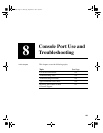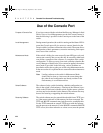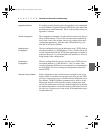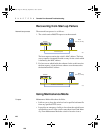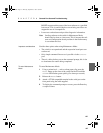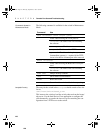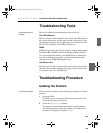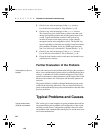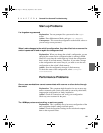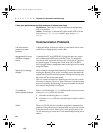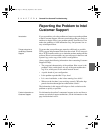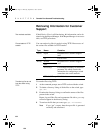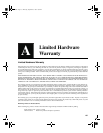
130
C H A P T E R 8 Console Port Use and Troubleshooting
130
3 Check for any relevant messages in the Trap window.
Use of this tool is described in “Trap Window”, p. 38.
4 Check for any relevant messages in the System window.
The System Log gives details about system events that occur
during start-up and operation and also the general state of the
switch. Typical information recorded in the System Log
includes all major events during start-up, system changes,
unexpected events and configuration errors. The System Log
reports such things as software successfully located and loaded,
ports enabled or disabled, and if any SNMP traps have been
sent. Use of this tool is described in “System Window”, p. 39
5 Check for any relevant messages in the Errors window.
Use of this tool is described in “Errors Window”, p. 40.
6 Check the fault counters on the switch ports and watch for any
significant error counters.
Further Evaluation of the Problem
If the problem is still not
isolated
If you still cannot resolve the problem after following the procedures
above, access the Monitoring menu within Local Management. Mon-
itoring is a valuable tool for the troubleshooting process and offers
extensive information on the performance and the status of the switch
hardware and software, the switch ports and the traffic patterns on
each port.
The general facilities available within the Monitoring menu are de-
scribed in the following subsections. The use of these facilities de-
pends on the problem and on any relevant information collected in the
previous procedure.
Typical Problems and Causes
Typical problems that
could be encountered
This section gives some examples of typical problems that could be
encountered during the installation and configuration of the switch,
and their possible cause. Configuration problems, defective cables
and problems with communication among devices are the most com-
mon switch malfunctions.
500.book Page 130 Thursday, September 2, 1999 1:50 PM




